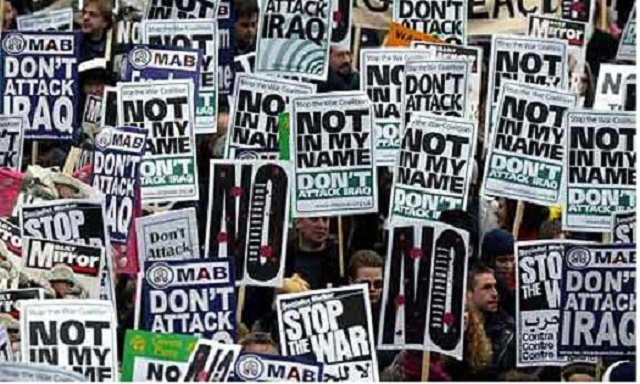‘Nobody listened to me’: Blair’s dismissal of the anti-war movement has fuelled violent extremism Comment
Ideas, New in Ceasefire - Posted on Monday, June 9, 2014 20:58 - 2 Comments
By Ian Sinclair

We Are Many, the forthcoming documentary on the 15 February 2003 anti-Iraq War march in London, is further proof that the day was one of the most important in recent British history. However, one aspect of the UK anti-Iraq War movement that is rarely discussed is its influence on home-grown Islamist extremism. In an attempt to think through this relationship, I devoted a chapter to the subject in my 2013 book ‘The March That Shook Blair: An Oral History of 15 February 2003’.
Broadly, the huge protests that occurred before and during the Iraq War, of which the 15 February 2003 was the largest, seem to have had two contradictory influences on violent extremism in this country.
First, the good news. With the ‘war on terror’ creating an upsurge in terrorism directed against the West, Milan Rai, co-editor of Peace News, argues “the February 15 demonstration was one of the most effective anti-terrorist actions of the last ten years” as “it convinced a whole bunch of people that Muslim concerns and Muslims as people in the Middle East were of value to large numbers of people in the West.”
Former Guantanamo Bay prisoner Moazzam Begg concurs with Rai’s analysis. Speaking in 2008, he noted “The Stop the War movement is a buffer which helps prevent terrorism in a way that the government would never conceive; when they see people demonstrating against the war it helps to pacify some of the radical elements who would otherwise have said ‘They’re all the same – go and bomb the lot of them.’”
This was the experience of Hadiya Masieh, a former Hizb ut-Tahrir (HT) activist, who told me the 15 February 2003 protest “did overthrow some of the arguments of HT – that they [the non-Muslim population] hate Muslims, that they demonise Islam. If so, then why is everyone out there [on the march]?”
However, we cannot escape the fact 7/7 and other atrocities did take place. And although it’s clear the bombers’ anger was primarily about the invasion and occupation of Iraq, there is an important link to the anti-war movement. Germaine Lindsay, one of the 7/7 bombers, met his wife at an anti-war rally. Raffaello Pantucci, author of the forthcoming ‘Love Death As You Love Life: Britain’s Suburban Mujahedeen’, told me three of the 21/7 failed suicide bombers – Muktar Said Ibrahim, Yassin Omar and Hussain Osman – attended anti-war protests. When he was captured in Rome, Osman said “I am against war. I’ve marched in peace rallies and nobody listened to me.”
Speaking to me in 2009, author and activist Mike Marqusee provided a possible explanation for this move from non-violent protest to suicide bombings. “It is definitely true that the more you reject a community’s legal, lawful and non-violent expressions and aspirations the more some of them are going to turn to illegal and violent responses”, he noted. “That was as true in the American Civil Rights movement as it is now.”
Anas Altikriti, spokesperson for the Muslim Association of Britain in 2003, told me that the 15 February 2003 protest showed many British Muslims that “Democracy, politics, engagement – don’t work.” Altikriti explained, “What the Abu Hamzas and the Anjem Choudarys of this world say when they argue with me is: ‘You can shake the hand of the infidels until the cows come home. Nothing will happen. You will be their servant, and you will do as they wish. You will be no one.’ That is what they say. I’m trying to disprove them. Now you tell me, who has won the argument? They have won the argument!” In short, Altikriti believes the perceived failure of the anti-war movement to stop the march to war pushed some elements within the UK Muslim community towards adopting more extremist positions.
When I put these points to Pantucci, he urged caution about making any sweeping claims. “The link between the non-violent protest, subsequent frustration and action is not as linear as you might suggest”, he told me. “I would say that in both the 21/7 and 7/7 lot, there is considerable evidence that they were very radical before the invasion of Iraq. Iraq seems to have acted as an accelerator, but I would say that they were headed down that path long before the 2003 rally.”
Of course, this is not science. The impact of social movements is always difficult to quantify. The evidence is messy, sometimes contradictory. And I should point out that this is dynamic does not necessarily apply to British Muslims only. Speaking to members of the Black Bloc on the day of the 26 March 2011 anti-cuts march in London, the Guardian noted “All of them said the failure of the peaceful anti-Iraq war march to overturn government policy was formative in their decision to turn to violence.”
What we can say is although it did not stop the war, the continuing influence and impact of the anti-Iraq War movement has been far wider and more far-reaching than many people appreciate. Those that marched against the war were very far from wasting their time. As Abjol Miah, a community activist in Tower Hamlets, told me: “If it wasn’t for the anti-war movement I think the Muslim youth would have been radicalised physically more.”
2 Comments
With Key on its side | Edge Times
[…] Image from Ceasefire […]


[…] to me': Blair’s dismissal of the anti-war movement has fuelled violent extremism by Ian Sinclair Ceasefire Magazine 9 June […]